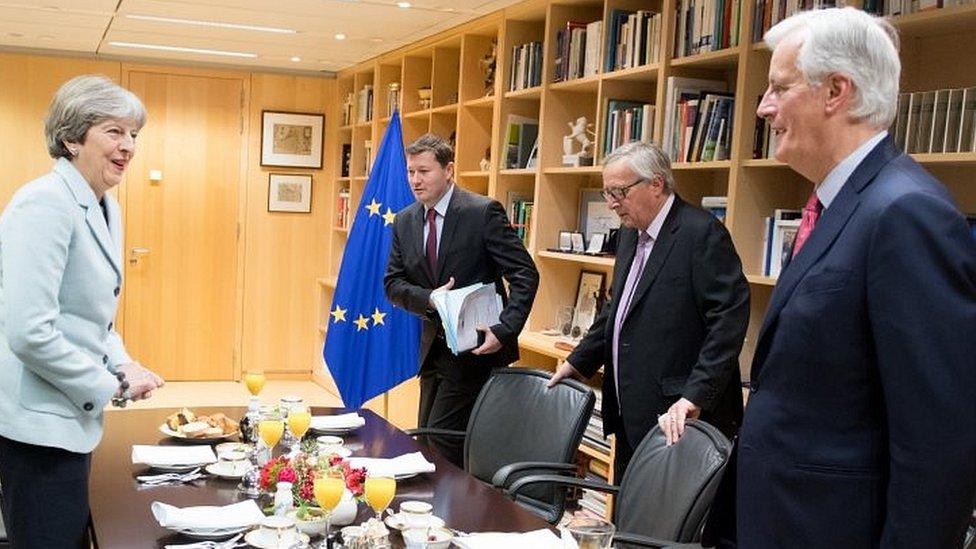Theresa May takes personal charge of Brexit talks
- Published
- comments
Dominic Raab says there is some 'shifting of Whitehall deckchairs'
Theresa May is taking personal control of Brexit talks with the EU, with Dominic Raab deputising for her.
Mr Raab was drafted in as Brexit Secretary to replace David Davis, who quit in protest at the prime minister's proposals for post-Brexit trade.
A special unit in Mrs May's office has played an increasing role in Brexit talks during recent months.
Tuesday's announcement, in a written statement by Mrs May, formalises that shift in responsibility.
Labour's Shadow Brexit Minister Jenny Chapman said: "Dominic Raab has been sidelined by the prime minister before he has even had the chance to get his feet under the table."
Mr Raab, who was a leading figure in the Leave campaign in the 2016 EU referendum, insisted he had not been sidelined, telling MPs it had always been the case that Mrs May was in overall charge of the talks and the announcement amounted to some "shifting of the Whitehall deckchairs".
He said the prime minister had suggested the changes to him on the day he was offered David Davis's job and he had agreed to them.
He acknowledged there had previously been "tensions" between his department and the Cabinet Office and the changes would ensure there was "one chain of command" to "get the best possible deal".
Stewart Jackson, who was chief of staff for David Davis before he resigned two weeks ago, has previously accused Number 10 of running a "shadow, parallel operation" and keeping officials and ministers from the Brexit department "in the dark" about Brexit proposals.
The Europe Unit led by senior civil servant Olly Robbins in the Cabinet Office, which reports directly to the prime minister, will have "overall responsibility for the preparation and conduct of the negotiations", Mrs May said in her written statement.
"DExEU (the Department for Exiting the EU) will continue to lead on all of the government's preparations for Brexit: domestic preparations in both a deal and a no-deal scenario, all of the necessary legislation, and preparations for the negotiations to implement the detail of the Future Framework.
"I will lead the negotiations with the European Union, with the Secretary of State for Exiting the European Union deputising on my behalf."
Mrs May said that DExEU would recruit some new staff to work on preparations for Brexit, while a number of Cabinet Office officials would move over to the department.
There will be no net reduction to staff numbers in Mr Raab's department, she said.
Mr Raab told MPs on the Brexit committee, he would be going back out to Brussels shortly to continue talks with EU negotiator Michel Barnier, alongside Mr Robbins.
Conservative MP Craig Mackinlay suggested a "coup" had taken place to take control of the Brexit process away from David Davis.
Mr Robbins said: "I honestly don't recognise the picture you are painting."

Theresa May with EU negotiating chief Michel Barnier (right) in December
It comes as the government published a White Paper saying how the UK's EU withdrawal agreement will be put into law.
Mr Raab said the proposed Withdrawal Agreement and Implementation Bill, external would deliver a "smooth and orderly" Brexit.
He said it would kick in only once MPs had given their backing to any deal struck with Brussels in the autumn. If there is no deal it will not be enacted.
The legislation would amend some parts of the EU Withdrawal Bill, passed last month after a series of knife-edge votes, to ensure the UK statute book continues to function during the 21 month transition period.
It would not end the supremacy of EU law altogether on 29 March next year, as promised in the EU Withdrawal Bill, with the continued jurisdiction of the European Court of Justice until December 2020, among other things.
Labour's Shadow Brexit secretary Sir Keir Starmer said it was now clear that the EU Withdrawal Act "will need major surgery," adding that the 29 March Brexit day was a "gimmick" which had come "unstuck".
"I can't remember legislation which has needed such great revision and amendment before the relevant parts have even come into force," he told MPs.
The new bill would create a financial authority to manage "divorce" payments, which will total between £35bn and £39bn, to the EU - and aim to protect citizens' rights.
Mr Raab told MPs: "It provides the clarity and certainty to EU citizens living here and UK nationals abroad that their rights will be properly protected.
"It will enact a time-limited implementation period, giving businesses greater certainty, giving the public finality with respect to our relationship with the EU and it provides for the appropriate means for paying the financial settlement.
"Above all, with 80% of the withdrawal agreement settled with our EU friends, the white paper is another key milestone on the UK's path to leaving the EU."
He said the publication of the white paper will allow "maximum scrutiny" of the government's plans by Parliament.
"It also sends a clear signal to the European Union that the United Kingdom is a reliable, dependable negotiating partner, delivering on the commitments it has made across the negotiation table," he told MPs.
In a separate development, the UK government guaranteed funding for EU programmes, external run by UK charities, businesses and universities up to the end of 2020, even if the UK left without a deal.